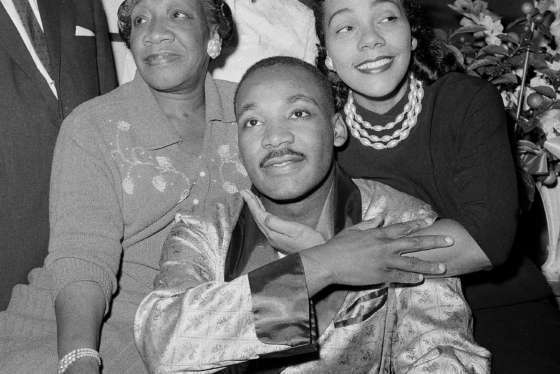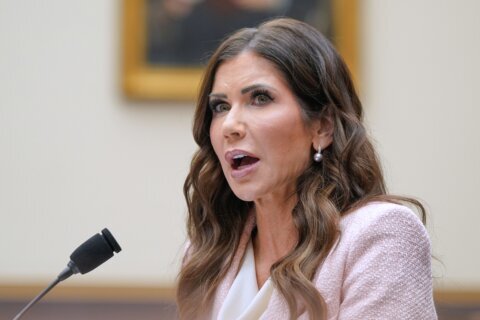WASHINGTON — Monday’s Martin Luther King, Jr. holiday, which this year falls on his actual birthday, is an annual, front-of-mind celebration of the slain civil rights leader. But we also remember King in a long-term, less-spectacular way: through the schools and streets that are named after him.
“School and street naming do something that the holiday cannot do,” said Derek Alderman, a professor of geography at the University of Tennessee and president of the American Association of Geographers. “A street and school name are permanent, physical markers. They’re in effect monuments or memorials to King. And a holiday comes and goes in one day. Some people observe it; some don’t. Some people go out of their way not to observe it, unfortunately.”
With a place name, however, “That permanence and that materiality and that tangibility … gets inscribed into almost everything we do — from delivering the mail to advertising to thinking about who we navigate the city [in] our GPS.”
And schools have a special place of importance, Alderman said.
“You are dealing with institutions … that are very close and intimate to one’s identity and one’s sense of place. And that sense of place is important for how we order ourselves, and how we see ourselves fitting into the world. [And] in many communities, an African-American sense of place is often been very absent, of at least devalued.”
Naming institutions after King, he said, is “a way of recovering a black sense of place that had been oppressed and suppressed for so long.”
Alderman has written about the institutions named after King. In a 2002 article, Alderman cited the cultural geographer Karen Till, who wrote that these arguments “often reflect larger social (and power) disputes about who has the authority to create, define, interpret and represent collective pasts through place.”
While neither Alderman nor the King estate were able to provide an exact number of schools or streets bearing King’s name, in 2002 Alderman counted 110 schools, placing it fourth on his list after George Washington, Thomas Jefferson and John F. Kennedy.
Neither source could verify when the first school was named after King, though a New York Times story mentions a Martin Luther King High School in Boston in November 1968 (King was killed April 4 of that year). But Alderman said Chicago named a street for him just a few months after his death, and his hometown of Atlanta wasn’t far behind.
After the bill declaring a national holiday passed in 1983, and the day was first observed in 1986, there was a new wave of namings as “King became a federally recognized icon,” Alderman said.
This can still come with controversy: Alderman said there’s still a “very intense debate” in nearby Johnson City, Tennessee, about naming a street after King, and his paper details objections in Riverside, California, to a potential Martin Luther King High School, in part because some parents were concerned that a school with such a name would be perceived by college admissions departments as inferior.
Streets in decline
Often, Martin Luther King-named streets also run through areas of economic decline, even violence. Indeed, at least one nonprofit agency is dedicated expressly to the improvement of such streets nationwide, and local groups address the same issues. Alderman said it’s important to remember the history of such areas.
“It’s important to remember that those schools and those streets were involved in a struggle for livelihoods and survival long before King was remembered [in their names]. Unfortunately people confuse the street name with the larger history of that place,” Alderman said.
Schools and streets named after King tend to be centered in black neighborhoods, Alderman said, even though such proposals generally start out hoping for major streets, and schools that attract a cross-section of ethnic groups. He called that problem “resegregating his memory,” and in his paper quoted a former principal of Martin Luther King Jr. Elementary School in San Diego, as saying the public thinks “any school that’s named after Dr. King would be in an inner-city area, and I think in most cases across the country they would be right. … I think that’s a tragedy.”
“There is an attempt to ensure that King is recognized as an American hero, rather than just a hero to African-Americans,” Alderman said. “But that often is part of the controversy — it’s still about convincing white America that King matters to all of us.”
‘A radical social challenger’
Alderman, who is white, learned the history of Martin Luther King relatively late in life — as a graduate student who had previously been fed “the traditional, Confederate-centric version” of the South he grew up in. He said the holiday, and the naming of institutions after King, should be used to remember who he really was.
“We still remember him now as being this almost-fatherly guardian of racial harmony and peace. And he certainly was an advocate of peace and integration and harmony. But he also was a radical social challenger. He wanted socio-economic equality; he wanted the poorest of the poor to be taken care of. He did not want America involved in Vietnam. He wanted some addressing of the American capitalist system, and the military-industrial complex.
“Those were highly controversial things, in addition to his views on racial integration. And so late in his life, he was not as popular as many people think he was.”
Alderman called for “a larger narrative … about why King matters, what image and legacy of King we remember, and what in fact he represented — in a common sense, but also in those things we tend to forget.”









